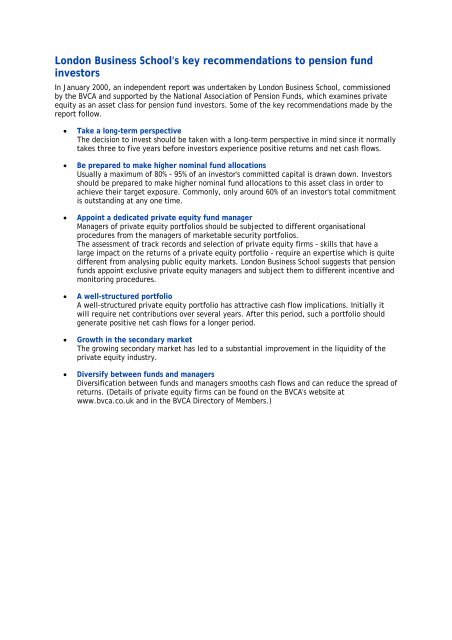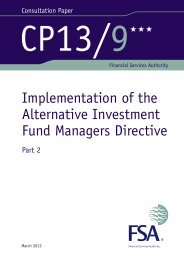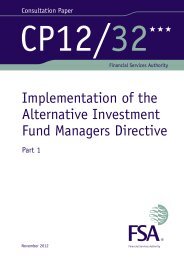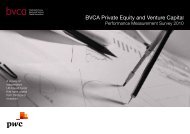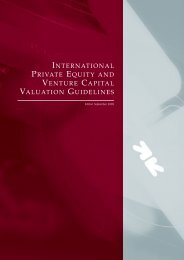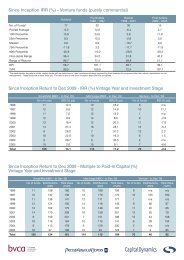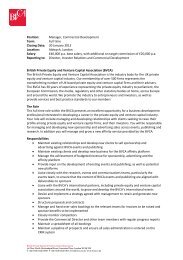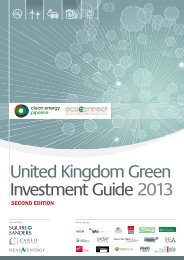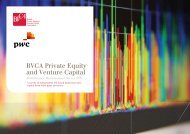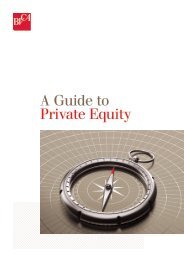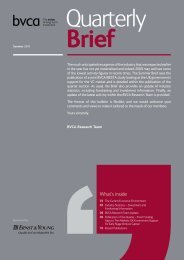How to invest in private equity - BVCA admin
How to invest in private equity - BVCA admin
How to invest in private equity - BVCA admin
You also want an ePaper? Increase the reach of your titles
YUMPU automatically turns print PDFs into web optimized ePapers that Google loves.
London Bus<strong>in</strong>ess School's key recommendations <strong>to</strong> pension fund<br />
<strong>in</strong>ves<strong>to</strong>rs<br />
In January 2000, an <strong>in</strong>dependent report was undertaken by London Bus<strong>in</strong>ess School, commissioned<br />
by the <strong>BVCA</strong> and supported by the National Association of Pension Funds, which exam<strong>in</strong>es <strong>private</strong><br />
<strong>equity</strong> as an asset class for pension fund <strong>in</strong>ves<strong>to</strong>rs. Some of the key recommendations made by the<br />
report follow.<br />
• Take a long-term perspective<br />
The decision <strong>to</strong> <strong><strong>in</strong>vest</strong> should be taken with a long-term perspective <strong>in</strong> m<strong>in</strong>d s<strong>in</strong>ce it normally<br />
takes three <strong>to</strong> five years before <strong>in</strong>ves<strong>to</strong>rs experience positive returns and net cash flows.<br />
• Be prepared <strong>to</strong> make higher nom<strong>in</strong>al fund allocations<br />
Usually a maximum of 80% - 95% of an <strong>in</strong>ves<strong>to</strong>r's committed capital is drawn down. Inves<strong>to</strong>rs<br />
should be prepared <strong>to</strong> make higher nom<strong>in</strong>al fund allocations <strong>to</strong> this asset class <strong>in</strong> order <strong>to</strong><br />
achieve their target exposure. Commonly, only around 60% of an <strong>in</strong>ves<strong>to</strong>r's <strong>to</strong>tal commitment<br />
is outstand<strong>in</strong>g at any one time.<br />
• Appo<strong>in</strong>t a dedicated <strong>private</strong> <strong>equity</strong> fund manager<br />
Managers of <strong>private</strong> <strong>equity</strong> portfolios should be subjected <strong>to</strong> different organisational<br />
procedures from the managers of marketable security portfolios.<br />
The assessment of track records and selection of <strong>private</strong> <strong>equity</strong> firms - skills that have a<br />
large impact on the returns of a <strong>private</strong> <strong>equity</strong> portfolio - require an expertise which is quite<br />
different from analys<strong>in</strong>g public <strong>equity</strong> markets. London Bus<strong>in</strong>ess School suggests that pension<br />
funds appo<strong>in</strong>t exclusive <strong>private</strong> <strong>equity</strong> managers and subject them <strong>to</strong> different <strong>in</strong>centive and<br />
moni<strong>to</strong>r<strong>in</strong>g procedures.<br />
• A well-structured portfolio<br />
A well-structured <strong>private</strong> <strong>equity</strong> portfolio has attractive cash flow implications. Initially it<br />
will require net contributions over several years. After this period, such a portfolio should<br />
generate positive net cash flows for a longer period.<br />
• Growth <strong>in</strong> the secondary market<br />
The grow<strong>in</strong>g secondary market has led <strong>to</strong> a substantial improvement <strong>in</strong> the liquidity of the<br />
<strong>private</strong> <strong>equity</strong> <strong>in</strong>dustry.<br />
• Diversify between funds and managers<br />
Diversification between funds and managers smooths cash flows and can reduce the spread of<br />
returns. (Details of <strong>private</strong> <strong>equity</strong> firms can be found on the <strong>BVCA</strong>'s website at<br />
www.bvca.co.uk and <strong>in</strong> the <strong>BVCA</strong> Direc<strong>to</strong>ry of Members.)


